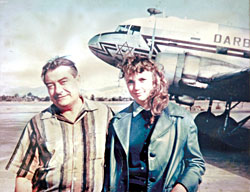 Ballet dancer, master chef, hotelier, tiger hunter, fighter pilot and trapeze artist-the list that describes Boris Lissanevitch is endless. He was a man you would meet once and never forget. Everyone knows Boris as the founder of the Chimney restaurant and Calcutta's Club 300 but what about as the father of Nepali tourism? Or even possibly King Tribhuban's diplomatic emissary?
Ballet dancer, master chef, hotelier, tiger hunter, fighter pilot and trapeze artist-the list that describes Boris Lissanevitch is endless. He was a man you would meet once and never forget. Everyone knows Boris as the founder of the Chimney restaurant and Calcutta's Club 300 but what about as the father of Nepali tourism? Or even possibly King Tribhuban's diplomatic emissary?
Boris Lissanevitch was a legend even before he ever set foot in Nepal. His reputation as a dancer for the Diaghilev's Ballet Russe was indomitable. "I owe everything to the Russian Revolution" claims Boris in the Michel Peissel's book Tiger for Breakfast. After being a part of the revolution at the age of 15 and even being hit on the thigh by a bullet, Boris at the age of 19 was ready to make his escape from Russia in 1924. After his escape, Boris toured the world for more than 10 years before he decided to make his base in Calcutta. This led to the break-up of his first marriage, as his wife Kira, who 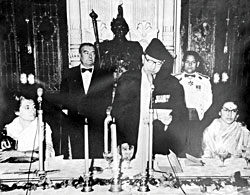 was also a dancer with the Ballet Russe, wanted to return to the US but Boris knew his future was in Asia.
was also a dancer with the Ballet Russe, wanted to return to the US but Boris knew his future was in Asia.
Boris then proceeded to establish Calcutta's famous Club 300. Based on London's Club 400, which was known for its exclusive membership, Club 300 strived to outdo its western counterpart. During the British Raj it was the first club that allowed both Indians and British to be members and it attracted society's cr?me de la cr?me, from Maharajas to fighter pilots.
During this period Boris also met his second wife, Inger. She was visiting Calcutta on her way to Europe and all Boris needed was one glimpse before he decided to follow her to Europe. His wooing paid off and despite the couple's 23-year age difference they were married in 1950.
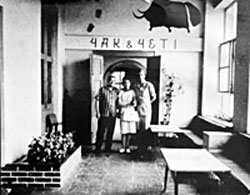
As Club 300 grew more popular it was not unusual to find visiting dignitaries or royalty from neighbouring countries enjoying Boris's famous hospitality. Among them was King Tribhuban, a frequent and popular guest. The monarch was so impressed with Boris that he invited him to his son Mahendra's wedding. This visit proved momentous as Boris fell in love with Nepal and never again strayed far from it.
As his son Alexander remembers, "It wasn't just with the hospitality of the Nepali people that he fell in love with, it was the innocence of the Nepali smile that captivated him". Soon after, King Tribhuban asked Boris to open a hotel in Kathmandu and to teach him to dance.
There is much speculation about why the monarch asked Boris to move to Nepal. Rajendra Adhikari, President of the Nepal-Russia Cultural Association says, "Rumours have it that Boris helped during the fall of the Ranas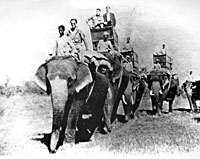 . King Tribhuban couldn't have done it without Indian support and the best man (to assist) would've been Boris through his contacts in Delhi. Boris is said to have taken letters and other messages to Indian leaders from King Tribhuban via Club 300".
. King Tribhuban couldn't have done it without Indian support and the best man (to assist) would've been Boris through his contacts in Delhi. Boris is said to have taken letters and other messages to Indian leaders from King Tribhuban via Club 300".
Whether Boris was a diplomatic emissary or played a hand in restoring the Shah dynasty is not certain but his role as the father of tourism in Nepal is undoubtedly deserved. Boris arrived in Nepal in 1951 and forever changed the way foreigners looked at this country.
As Adhikari says: "In the 1950s, people abroad knew only two things about Nepal-Mt Everest and Boris." Kathmandu's first international hotel, the Royal, which included the soon famous Chimney Restaurant were where Boris showed his legendary hospitality 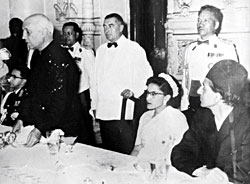 and culinary skills.
and culinary skills.
Still, despite the new establishment, few tourists were coming to Nepal. Visas were difficult to obtain and the government limited visits. Boris was determined to change this. He convinced a group of 20 tourists from Calcutta, mostly women, to come to Nepal in 1955 and then proceeded to have a hot discussion with King Mahendra about granting them a 15-day visa. Finally the king relented, the guests arrived and Boris held the country's first handicraft exhibition in his hotel.
Boris was a familiar sight on the streets of Kathmandu-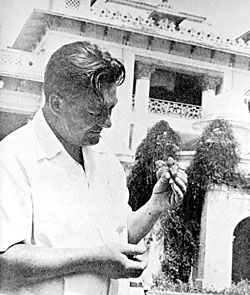 red faced and cheery in his typical short-sleeved shirts, pants and cigar. Growing up with him was similar to leading a royal life. As Alexander fondly recalls, "We lived in a large European style palace, with ayahs and lots of animals, from tigers to deer. It was very grand-even when we went to school at St Xaviers in Jawalakhel, we used to go on horseback."
red faced and cheery in his typical short-sleeved shirts, pants and cigar. Growing up with him was similar to leading a royal life. As Alexander fondly recalls, "We lived in a large European style palace, with ayahs and lots of animals, from tigers to deer. It was very grand-even when we went to school at St Xaviers in Jawalakhel, we used to go on horseback."
Despite the legends that his life was weaving, Boris was unable to sustain his businesses. Every great man has his frailty and Boris's was a lack of business acumen. "He was very giving, kind and tremendously generous. He never looked at business from a materialistic view-that was his greatest charm and his biggest drawback," says Alexander. 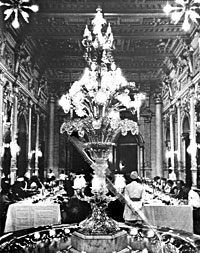
Everyone who came to him but couldn't afford the Royal Hotel's prices stayed as his personal guest. Mountaineering expeditions would camp out on his lawns. But Boris's ultimate fall came after the opening of the splendid Yak and Yeti Hotel in 1977. Though he opened a few restaurants and dabbled in other projects after that, he was never able to regain his earlier fame.
Boris died at 80 in Kathmandu and as per his wish was buried at the British cemetary . He had been all over but chose to make his home in Nepal. He was a legend any nation would've been proud of but he devoted himself to this country, giving as much as he took from it, if not more.
The Lissanevitchs
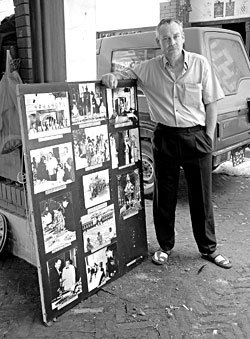 Though the legendary Boris must have been a difficult figure to live up to, many members of his family have developed their own reputations. His first wife, Kira Ivanovsky, runs a non-profit ballet company called Ballet Fantasque in the Monterey Peninsula California. Boris's daughter with Kira, Xenia or Lala as she was affectionately called, lives in Oakland, California and works as a copy editor for a publishing house. Inger, Boris's second wife, currently resides in Bhaktapur. His eldest son with Inger, Mischa, used to run a restaurant in Kathmandu called Sanga Mitra but it closed down. Today he has a restaurant in Goa. Alexander, Boris's second son from Inger, used to help his father with catering but now owns his own art business and plans to open a resort in Tokha. The youngest son from Inger, Nicholas, lives in Denmark where he works in a hospital.
Though the legendary Boris must have been a difficult figure to live up to, many members of his family have developed their own reputations. His first wife, Kira Ivanovsky, runs a non-profit ballet company called Ballet Fantasque in the Monterey Peninsula California. Boris's daughter with Kira, Xenia or Lala as she was affectionately called, lives in Oakland, California and works as a copy editor for a publishing house. Inger, Boris's second wife, currently resides in Bhaktapur. His eldest son with Inger, Mischa, used to run a restaurant in Kathmandu called Sanga Mitra but it closed down. Today he has a restaurant in Goa. Alexander, Boris's second son from Inger, used to help his father with catering but now owns his own art business and plans to open a resort in Tokha. The youngest son from Inger, Nicholas, lives in Denmark where he works in a hospital.
A Tiger of a man
'Go and see Boris. He alone can help you. There is nothing Boris cannot fix,' says Mrs Perry in the opening pages of Michel Peissel's book Tiger for Breakfast.
Based on the legend of Boris Lissanevitch, the book story follows the chance meeting of Peissel and Boris, which launched an incredible friendship. A simple read written in the first person, Tiger for Breakfast reveals Peissel's obvious fascination with Boris and his lifestyle. It records in detail Boris's life and achievements in Nepal, from being the first person to grow strawberries here to being the first to breed fine quality pigs for bacon.
At times the amazing events read larger than life then as Peissel writes, 'Boris's name could not be mentioned without someone recalling a new 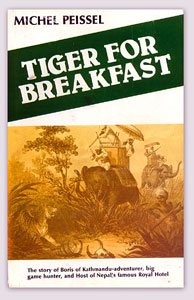 and even more incredible incident involving him.'
and even more incredible incident involving him.'
Tiger For Breakfast
Michel Peissel
Time Books International 1990
274 Pages


